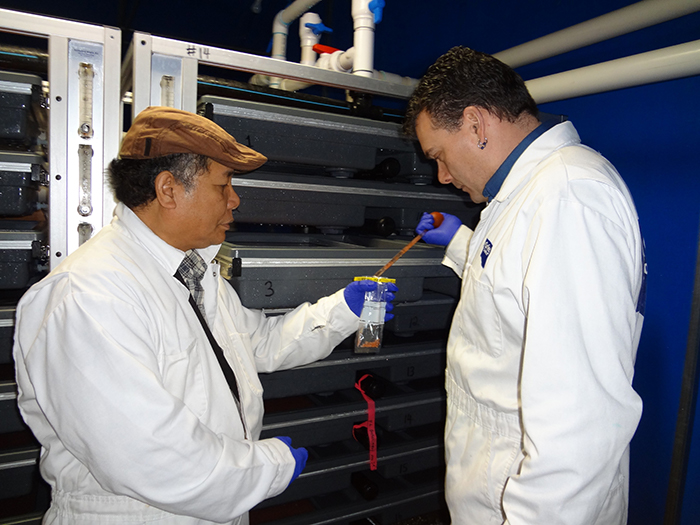Dr. Jesse Ronquillo, NIC Aquaculture Technician certificate instructor collects salmon egg samples from incubation trays with Scott Peterson, the hatchery site manager at Grieg Seafood.
NIC will launch a new Aquaculture Technician certificate this January to provide students with technical skills to work with a variety of species in BC’s growing aquaculture industry.
The four-month certificate is the first of two new aquaculture offerings at NIC, developed in response to an industry call for workers with broader field skills.
“We heard from industry about the need for more advanced technician training and education to fill current and projected vacancies,” said Cheryl O’Connell, NIC’s dean of trades and technical programs. “This new certificate prepares students for entry-level positions and provides an excellent foundation for further studies.”
The $600,000 project is funded through the Sector Labour Market Partnerships program under the Canada-British Columbia Labour Market Development Agreement.
NIC has offered Aquaculture Technician Training since 2014. The new certificate includes an updated curriculum, more occupational health and safety training and the unique ability to ladder into BC’s first advanced production-training program, the Aquaculture Technician diploma, scheduled to begin in fall, 2019.
Dr. Jesse Ronquillo, a world-renowned aquaculture researcher and educator, developed the programs’ curriculum, which was informed by the BC Shellfish Growers Association, the BC Salmon Farmers Association and industry leaders.
“There is a growing interest in aquaculture around the world, creating a need for technical training and education,” said Ronquillo. “These programs prepare students for a range of industry jobs, from hatchery to farm-site work. The certificate gives students training in a variety of aquaculture species including finfish, shellfish and algal production techniques.”
According to the BC Agriculture and Seafood Statistics 2017, farmed salmon was BC’s top exported agrifood and seafood commodity, geoduck clam exports rose 50 per cent from 2016 to 2017 and oyster exports have increased annually since 2010.
Both aquaculture programs will take place at NIC’s Campbell River campus, now undergoing a $17.6 million expansion and renovation.
“The planned facility will enable students to raise a variety of species through various development stages,” said Ronquillo.
Registration for the certificate is open now. For more information, or to register, visit https://www.nic.bc.ca/programs/trades-apprenticeship-technical/trades-technical/.
Download High Res Images Media Contact C: 250-207-6946 media@nic.bc.ca